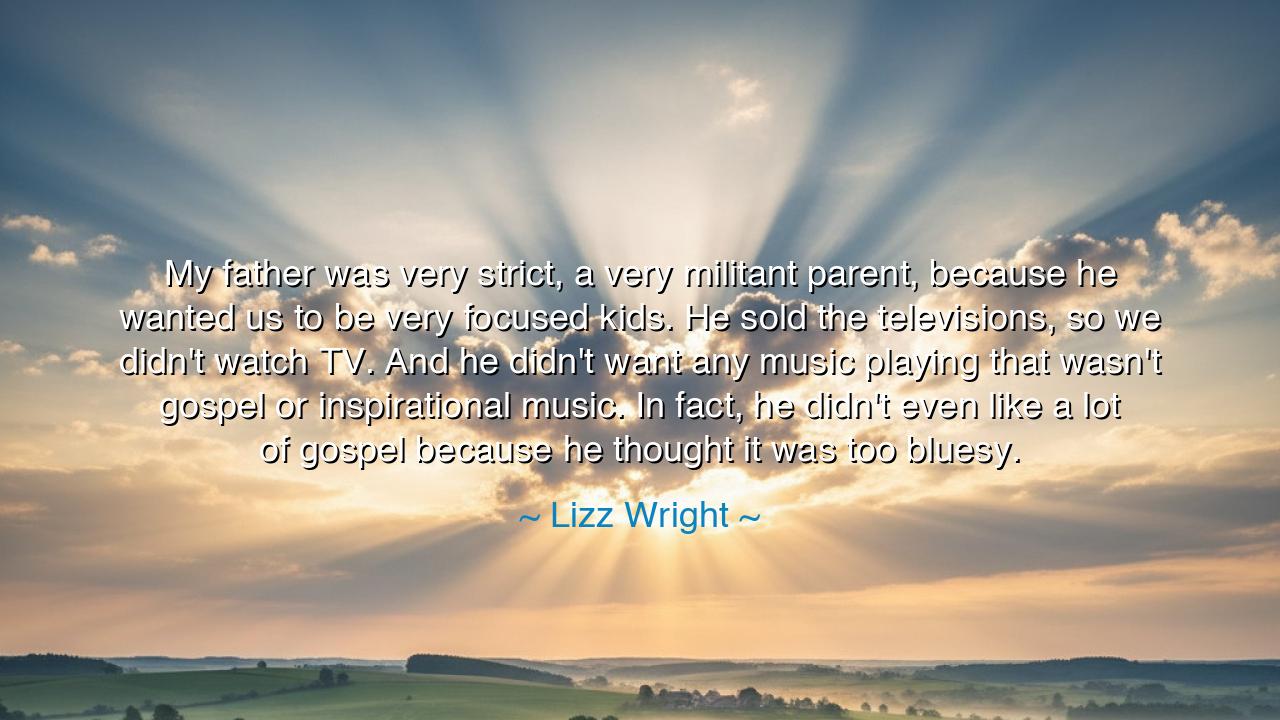
My father was very strict, a very militant parent, because he
My father was very strict, a very militant parent, because he wanted us to be very focused kids. He sold the televisions, so we didn't watch TV. And he didn't want any music playing that wasn't gospel or inspirational music. In fact, he didn't even like a lot of gospel because he thought it was too bluesy.






In the journey of life, there are many paths to wisdom and discipline, but none so powerful as the lessons passed down by those who shape our upbringing. Lizz Wright, reflecting on her father's strictness, reveals the profound impact of a parent’s influence: "My father was very strict, a very militant parent, because he wanted us to be very focused kids. He sold the televisions, so we didn't watch TV. And he didn't want any music playing that wasn't gospel or inspirational music. In fact, he didn't even like a lot of gospel because he thought it was too bluesy." Her words offer a glimpse into a world where discipline was not just about control, but about shaping character, honing the spirit, and instilling a deep sense of purpose in the next generation.
In the ancient world, too, parents were seen as the primary architects of character. The great Greek philosopher Plato once said, "The most important thing in life is to teach a child how to think, not what to think." This wisdom reflects the idea that true parenting is not about indulgence or leniency, but about guiding the soul of the child to understand what is important—what is noble, what is worth striving for. Lizz Wright’s father, in his strictness, sought to shield his children from distractions—from the empty entertainment of the world—and instead focused them on what he believed would build strength, focus, and a deeper understanding of the divine.
There is a wisdom in Lizz Wright’s father’s actions that echoes through the ages. Consider the story of Spartan training, where young warriors were raised not with comfort but with rigorous discipline. The Spartan mothers were known to say, "Come back with your shield or on it," a saying that reflected the belief that a child must be taught to be strong and focused, not just to survive but to thrive. The intention behind such discipline was never cruelty, but preparation for greatness. Lizz’s father, though stern, was focused not on immediate pleasure or freedom, but on building his children’s resilience and strength—qualities that would serve them not just in childhood, but throughout their lives.
The removal of the television, and the restriction of music, may seem harsh in today’s world, but it reflects a deeper truth about the nature of influence. Just as Plato cautioned against the corrupting influence of entertainment and excess, so too did Lizz Wright’s father recognize that the world was filled with distractions that could pull his children away from their higher calling. He chose to shelter them from these distractions to allow them to focus on things of greater value, like the gospel and inspirational music—forces that would shape their character and their worldview. His strictness was an act of love, for he understood the importance of guiding the mind and spirit of the young toward a noble pursuit.
However, even in the strictest forms of discipline, there is a lesson in balance. Lizz Wright’s father's distaste for bluesy gospel music, which he thought too worldly, offers us a deeper contemplation on the role of joy and freedom in life. While discipline is crucial, freedom of expression, creativity, and joy are equally necessary for the full development of the human spirit. There is a place for rhythm and soul, for the expression of pain, joy, and struggle in music, just as there is a place for the sacred and the inspirational. In the pursuit of greatness, there must be room for both structure and creative freedom, for the human spirit thrives in both order and expression.
The lesson we learn from Lizz Wright’s reflection on her father’s strict upbringing is clear: true discipline is not about stifling creativity or freedom, but about guiding the soul to pursue higher purposes. The removal of distractions—whether they are from the television, music, or other external forces—helps to focus the spirit and mind on what truly matters. Yet, it is equally important to remember that life must also be filled with moments of joy, creativity, and freedom, for the journey toward greatness is not just about strict control but about nurturing the full depth of the human spirit. Thus, we must strike a balance in our own lives, shielding ourselves from distractions while still leaving room for the expression of our deepest emotions and creativity.
To future generations, take this wisdom to heart: discipline is the foundation of strength, but it must be tempered with balance. Cultivate focus, resilience, and strength, but also allow space for the creative expression of your soul. Whether through music, art, or any other form of expression, make sure that your life is shaped by higher ideals, but also that your spirit remains free to explore, create, and grow. Like Lizz Wright’s father, you too can guide the next generation—not with harshness, but with love, purpose, and a deep understanding of what truly feeds the soul.






AAdministratorAdministrator
Welcome, honored guests. Please leave a comment, we will respond soon